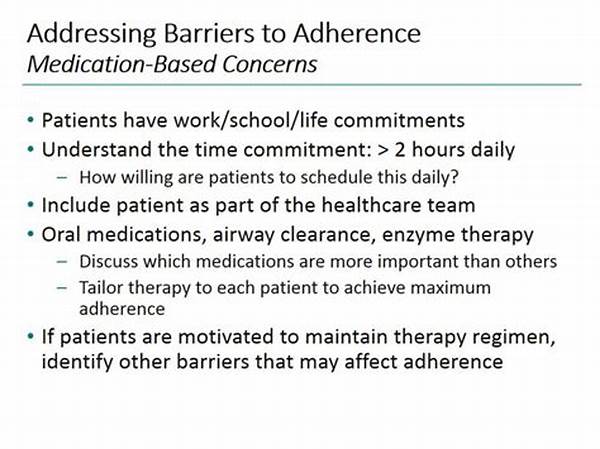Adherence to prescribed treatments and recommendations is a cornerstone of effective healthcare management. However, a multitude of barriers can impede patients’ ability to consistently follow medical advice. Healthcare professionals continually seek innovative techniques for addressing adherence barriers, aiming to enhance patient outcomes. Understanding these barriers, ranging from psychological to socio-economic factors, is crucial for developing strategies that can effectively mitigate them and promote better health practices.
Read Now : Medication Lock Boxes For Caregivers
Understanding the Problem of Adherence Barriers
Adherence barriers can manifest in various forms, such as forgetfulness, misunderstanding of medical instructions, financial constraints, and lack of motivation or support. These obstacles can significantly affect health outcomes, especially for patients with chronic illnesses who require consistent treatment. Techniques for addressing adherence barriers must be comprehensive and individualized, considering the patient’s specific circumstances. By employing a combination of education, motivation, and support strategies, healthcare providers can facilitate better adherence and improve overall patient health. Additionally, utilizing technology and effective communication can bridge gaps, ensuring patients have the necessary resources and understanding to follow through with their healthcare plans. Successfully addressing adherence barriers not only enhances patient well-being but also optimizes healthcare system efficiency by reducing hospital readmissions and complications.
Key Techniques for Addressing Adherence Barriers
1. Patient Education: Providing comprehensive education helps patients understand the importance and benefits of their treatment plans. Techniques for addressing adherence barriers through education must be clear, concise, and tailored to individual needs.
2. Motivational Interviewing: This technique involves engaging patients in conversations that help them find personal motivation to adhere to their treatment plans, addressing psychological barriers effectively.
3. Use of Technology: Implementing digital reminders and telemedicine consultations can help overcome forgetfulness and accessibility issues, critical techniques for addressing adherence barriers.
4. Social Support Systems: Encouraging family involvement or support groups can provide emotional and practical support, playing a vital role in techniques for addressing adherence barriers.
5. Financial Assistance: Providing information or access to financial resources helps alleviate the economic burdens that often hinder adherence, forming an essential part of techniques for addressing adherence barriers.
Implementing Effective Strategies
Healthcare providers are tasked with the challenge of transforming potential obstacles into manageable aspects of patient care. Techniques for addressing adherence barriers should be implemented with a focus on patient-centered care, emphasizing collaborative approaches that involve patients in their health decisions. This engagement fosters a sense of ownership and accountability, empowering patients to overcome barriers proactively. Regular follow-ups and feedback mechanisms also play a crucial role, enabling continuous assessment and adjustment of techniques that address adherence obstacles effectively. By fostering an environment that values patient autonomy and support, healthcare professionals can significantly impact adherence rates positively.
Adherence Barriers: The Informal Guide
Alright, let’s break it down – when it comes to sticking to plans, especially health ones, everyone hits roadblocks. So, what’s the 411 on techniques for addressing adherence barriers that actually get the job done?
1. Communicate Clearly: No jargon, just simple talk.
2. Tech Revs Up: Apps to give you that nudge.
3. Buddy System: Because together is easier.
4. Money Matters: Cut costs like a ninja.
Read Now : Customized Health Solutions With Genomics
5. Why It Matters: Find your true north.
6. Feedback Frenzy: Double-check for the win.
7. Digital Doses: Reminders that rock your phone.
8. Family First: They’ve got your back.
9. Map It Out: Plans that stick.
10. Celebrate Wins: High fives for progress.
Innovative Approaches to Overcome Adherence Barriers
Addressing adherence barriers involves a multifaceted approach, focusing not only on the barriers themselves but also the unique circumstances of each patient. Personalized plans are paramount. Techniques for addressing adherence barriers include using artificial intelligence tools to predict and identify potential adherence issues ahead of time. Furthermore, interprofessional collaboration between physicians, nurses, pharmacists, and social workers brings diverse expertise together, fostering a comprehensive support network for patients. This team-based approach ensures that all aspects of a patient’s well-being are considered.
The Role of Healthcare Providers in Enhancing Adherence
Healthcare providers have an integral role in crafting effective strategies to address adherence barriers. Their direct interaction with patients positions them uniquely to recognize and address these challenges head-on. Techniques for addressing adherence barriers include active listening and empathy, which are vital in understanding the patient’s perspective and identifying specific hindrances they face. Through patient storytelling, healthcare providers can gather critical insights, adjusting treatment plans accordingly to better suit individual needs. Furthermore, ongoing education and training for healthcare professionals ensure they remain equipped with the latest knowledge and skills to effectively deploy techniques for addressing adherence barriers.
Undoubtedly, the persistent and nuanced nature of adherence barriers calls for innovation and adaptability within healthcare systems, ensuring that patient adherence, and ultimately patient health, remains at the forefront of care delivery.
Conclusion
In sum, techniques for addressing adherence barriers are vital processes that enhance patient compliance with healthcare directives. By integrating education, motivation, and technology, healthcare systems can facilitate effective patient engagement and adherence. Ultimately, the goal is to ensure that each patient receives the support and resources necessary to overcome obstacles and succeed in their health journey. As these methodologies continue to evolve, collaboration and communication remain pivotal, ensuring patients have the best opportunity to achieve optimal health outcomes.
